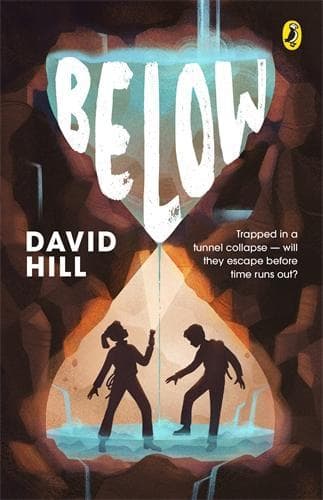Review: Below
Reviewed by Jessie Neilson
The entrance to Puketapu Tunnel always makes Liam Geary take a deep breath in anticipation and awe. It is as high and wide as a three-storey building, concrete-lined, and scary. His father is an engineer involved in cutting the tunnel and they agree that at times it feels as if one is boring into a colossal living thing. His father talks politely to the mountain which groans and shakes, as if to voice displeasure. Water trickles, as if someone's blood. Perhaps one should not interfere with an entity so sacred, though project work continues relentlessly round the clock.
Yet when the worksite is closed for a safety inspection, Liam cannot help himself in venturing inwards. He has a point to prove. This is prompted by Room 9 classmate and strident environmentalist, Imogen Parkinson, his daily opponent in quips. Dressed head to toe in green and even green of eyes, Imogen echoes her parents' sentiments, loath to hear other viewpoints. For the rest of the class including their teacher, their debates are highly entertaining, even more reason for Liam's eagerness to be "right.” He has reached plimsoll (as in, plimsoll line) with her, done with explaining that the tunnel will have environmental benefits in the end.
In this young adult novel by renowned storyteller David Hill, we witness two adolescents who find themselves completely out of their league, trapped in the tunnel. In a battle with overwhelming natural forces, the young pair must draw on their ingenuity to survive. Sources of light, air, and sustenance, for example, are imperative. Keeping them company is the enormous Tunnel Boring Machine (TBM), named Lucia, kitted out with gadgets and her own computer systems. Normally she is surrounded by workers but this time it is only her, with her hardened steel teeth, a monster to cut into the rock face.
Hill draws the reader in from the inclusionary first sentence: "When you stood deep inside the tunnel...". A young reader is placed alongside our adventurers. In this situation everyone learns exactly how intense pitch blackness can be. Now, these young people are entirely responsible for their life or death. At times it is silent and still, at others, the land is mumbling and bellowing.
There is realistic colloquial language, full of impetuousness as the two become more frustrated the longer that they are trapped. Imogen calls it ‘your useless tunnel,’ forcing Liam to take ownership of their mess. In his head he retaliates by naming her ‘Greeny Girl.’ We feel their desperation intensify as the situation worsens. They show self-awareness, reminding themselves to rein in their ‘shittiness.’ Liam quickly tires of Imogen's know-it-all preaching, and we follow the slight shifts as they grow to necessary allegiance from foes.
Both these two and the reader are reminded of similar real-life crises. For Imogen and Liam, it is the trapped Chilean miners; for most young readers it will be the Thai cave soccer team. Yet for these two it is now real. Hill does not sensationalise it. He prioritises analytical thinking, struggling emotional states and logistics. In addition, the young reader would have continual empathy for these average, everyday young people.
Below has chapters, in manageable reading chunks, for an age range of those, most probably, 10–13-year-olds, bridging intermediate years and looking towards independence. Imogen and Liam both echo this quandary. On one hand, they both desire to leap off, with their own ideas, reliant on nobody; on the other, they desperately need outside help. A young reader will follow our fallible heroes, absorbed; all we can do is speculate if help might be coming, or if they will meet their ends, all alone, trapped within the earth.
Reviewed by Jessie Neilson
